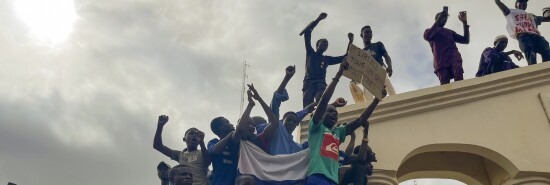
Niger’s political crisis could affect the US counterterrorism footprint
Daniel DePetris
Video Embed
Nearly three weeks after the Nigerien presidential guard overthrew President Mohammed Bazoum, the political crisis in the Sahelian African state shows no signs of ending.
The coup caught nearly everybody off guard, including Niger’s neighbors in the Economic Community of West African States, which quickly issued an ultimatum to the Nigerien junta: restore Bazoum to his duly elected post or face military intervention. That ultimatum expired on Aug. 7 with nothing to show for it besides putting a vague force on standby for an operation that the African Union doesn’t even support.
UP FOR DEBATE: TRUMP, DESANTIS AND 2024 GOP HOPEFULS’ STANCE ON MILITARY AND UKRAINE
While the Biden administration is concerned about Bazoum’s health and getting Niger back to democratic governance — U.S. deputy secretary of State Victoria Nuland spoke with the junta last week but came away empty-handed — it’s also true that the restoration of democracy isn’t Washington’s top priority in the African country. Maintaining a counterterrorism presence in Niger is likely goal one, two, and three for the United States national security apparatus.
The Biden administration is wrestling with an immediate question: How can the U.S. continue to work with the very Nigerien military that’s holding its president hostage? Policymakers and lawyers in the White House, State Department, and Pentagon are trying to find workarounds as we speak.
On Aug. 17, CNN reported that the administration is considering several options to preserve the U.S. counterterrorism footprint in Niger, including declaring the events in the country a coup but nevertheless utilizing a national security waiver to maintain as much business as usual as possible.
Thus far, the U.S. defense posture in Niger hasn’t changed. The Pentagon would like to keep it that way, if only because Niger has proven to be a far more pliable counterterrorism partner than other countries in the Sahel.
There are approximately 1,100 U.S. troops deployed in the country, and the U.S. operates a $110 million drone base in the Agadez region, which the Pentagon uses as an intelligence, surveillance, and reconnaissance hub against the alphabet soup of terrorist groups that have turned the Sahel into a living hell over the last 10 to 15 years. The Armed Conflict Location and Event Data project reported a 77% increase in deaths from political violence in Burkina Faso and a 150% increase in Mali between 2021 and 2022. The Global Terrorism Index finds that 43% of all deaths from terrorism last year occurred in the Sahel.
The U.S. is understandably worried about this violence ballooning to an even greater extent if it pulled out of the region. Bazoum and his government obviously want U.S. forces to stay. The Nigerien junta, which after all, was trained and advised by the U.S., doesn’t seem to be in a hurry to cut security ties with the U.S. either. The general consensus in Niamey appears to be that the only winner of a U.S. pullout is the jihadists running amok.
Yet, for the U.S., not all jihadists are created equal. “Jihadist” is a throwaway term we often use to describe a band of bloodthirsty misfits who are willing to kill innocent people to accomplish a political goal. The fact that a jihadist group exists in a particular country doesn’t automatically mean the U.S. needs to establish a counterterrorism apparatus there.
The U.S., after all, doesn’t have unlimited resources; being everywhere, all of the time is neither prudent in terms of strategy nor resource allocation.
Some may scratch their heads at this statement. Why, they may ask, would the U.S. want to cede ground to terrorists? But this is the entirely wrong frame of reference. The right one is to scrutinize the goals of the various terrorist groups and distinguish between them.
Terrorist groups that have the intent and capability of attacking the U.S. obviously deserve far more attention from Washington’s counterterrorism establishment than those that are dastardly but nevertheless have local goals, whether it be governing their own areas or overthrowing a local government. The groups operating in the Sahel may take the al Qaeda or IS name to boost their recruitment and fundraising, but their actions suggest their objectives are contained to West Africa.
CLICK HERE TO READ MORE FROM THE WASHINGTON EXAMINER
It’s unlikely the U.S. will pack up and leave the region. At worst, U.S. counterterrorism operators will move to find another home, say, perhaps in Chad or the Ivory Coast. But in the event, the Sahel becomes a lost cause, we shouldn’t resort to panic and threat inflation.
Daniel DePetris (@DanDePetris) is a contributor to the Washington Examiner’s Beltway Confidential blog. His opinions are his own.
